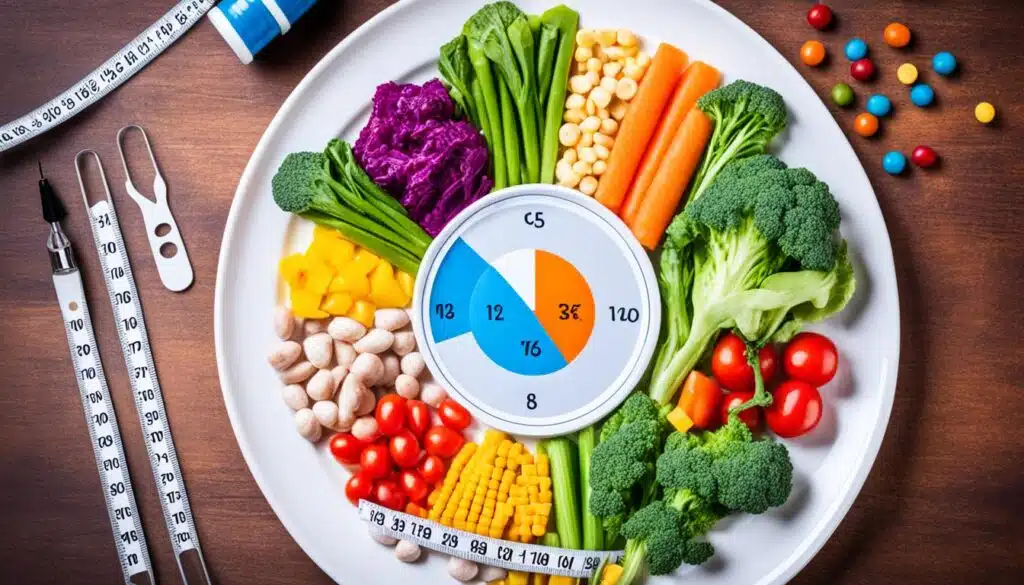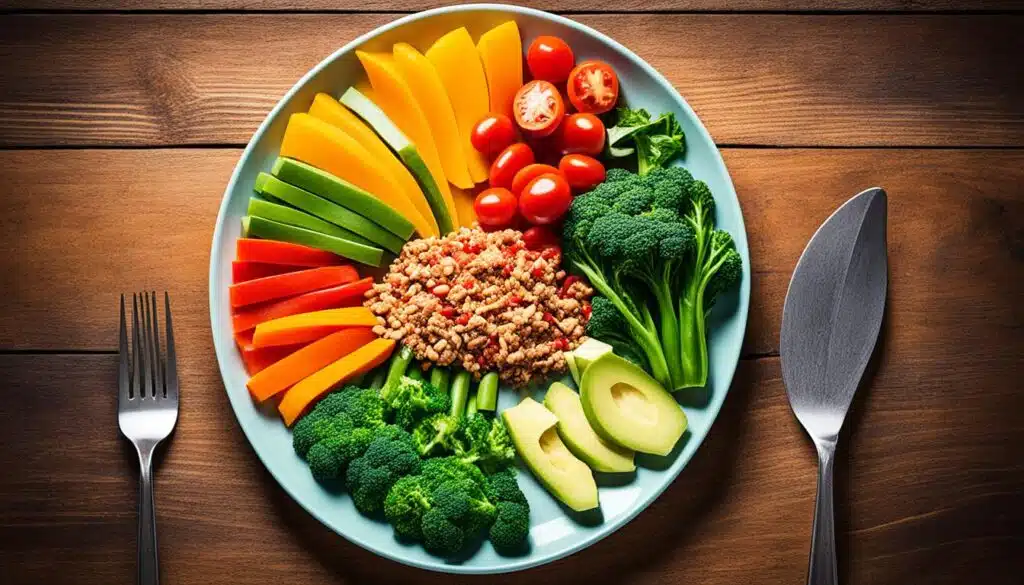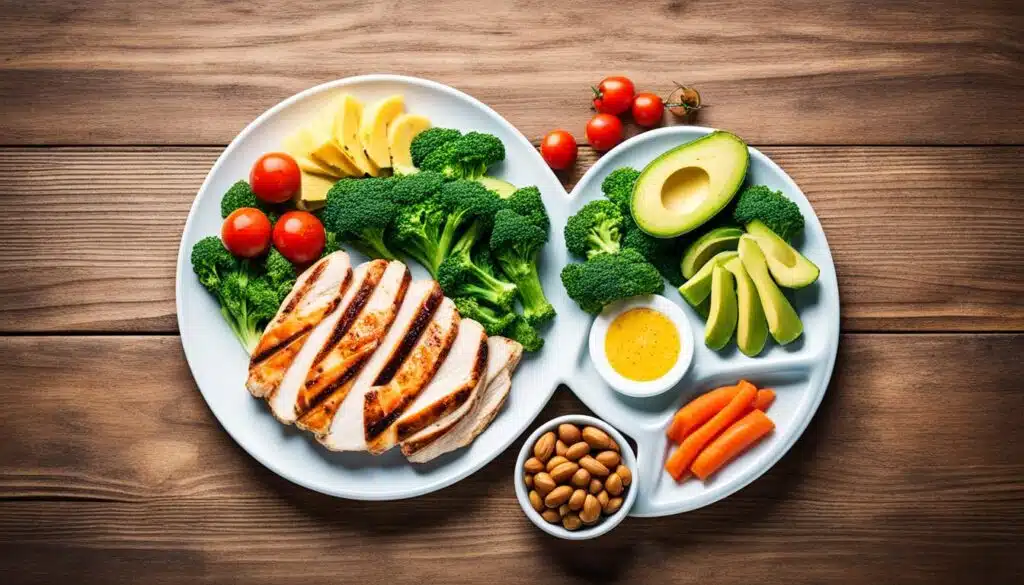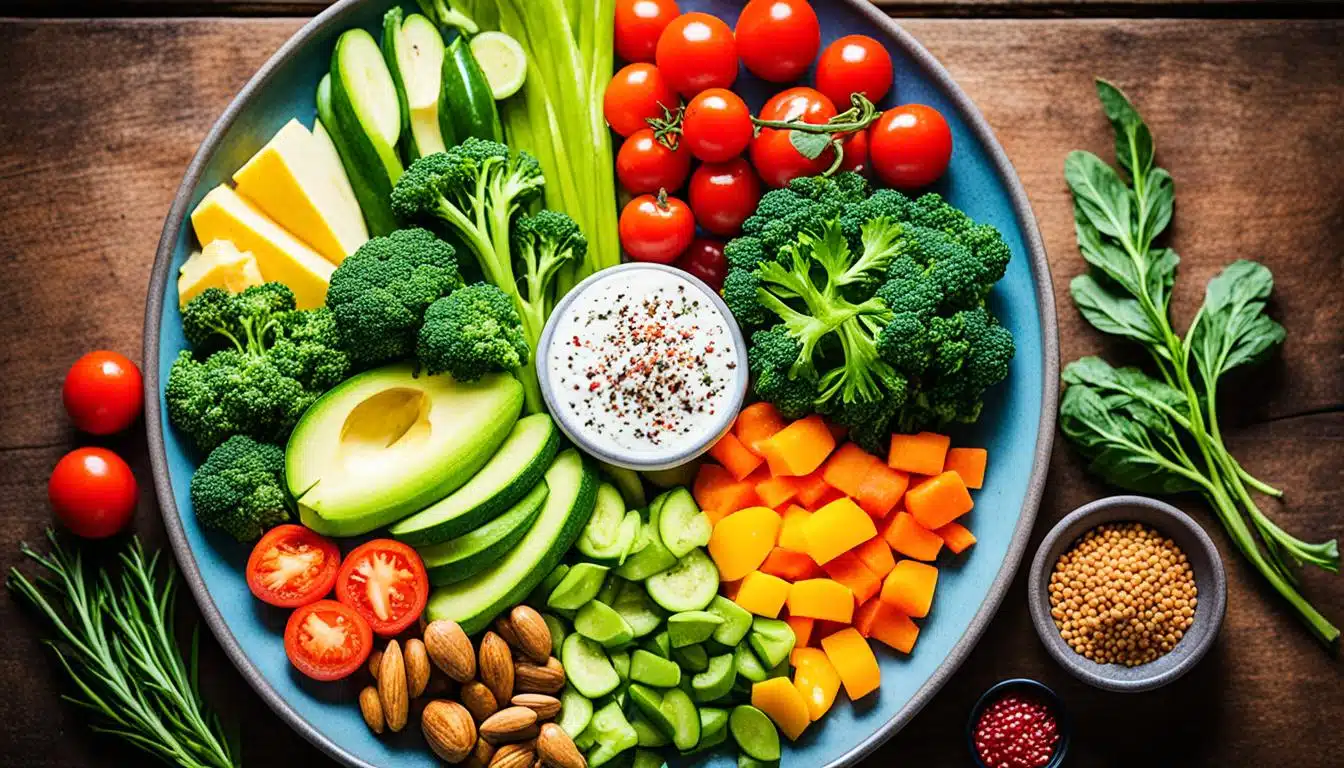Are you struggling with insulin resistance? Do you find it challenging to manage your blood sugar levels effectively? The insulin resistance diet could be the solution you’ve been seeking. By adopting a specialized diet designed to target insulin resistance, you can unlock your body’s potential for better health and blood sugar control.
Key Takeaways:
- Understanding insulin resistance is crucial for managing blood sugar levels and preventing prediabetes or type 2 diabetes.
- The insulin resistance diet focuses on consuming whole grains, managing carbohydrates, avoiding added sugars and saturated fats, and selecting low-glycemic-index foods.
- Creating a personalized meal plan can aid in controlling blood sugar levels and managing insulin resistance effectively.
- Lifestyle changes, such as adopting healthy habits and achieving a healthy weight, play a vital role in improving insulin resistance.
- The link between insulin resistance and diabetes underscores the importance of managing insulin levels through diet and weight loss.
Now, let’s delve deeper into the world of insulin resistance, discover the role of diet in combating it, and learn how you can make positive changes to unlock your body’s potential for optimal health.
Understanding Insulin Resistance
Insulin resistance is a condition where the body’s cells become less responsive to the effects of insulin, a hormone that helps regulate glucose (blood sugar) levels. This leads to higher levels of glucose in the bloodstream, as the cells are unable to efficiently absorb and utilize glucose for energy. Insulin resistance is a key factor in the development of prediabetes and type 2 diabetes.
Glucose, which comes from the food we eat, is the primary source of energy for our body. After a meal, glucose levels rise, triggering the release of insulin from the pancreas. Insulin helps move glucose from the bloodstream into the cells, where it can be used as fuel. However, in individuals with insulin resistance, the cells don’t respond adequately to insulin’s signal, resulting in persistently high blood sugar levels.
Insulin sensitivity is the measure of how well the body’s cells respond to insulin. In people with normal insulin sensitivity, the cells efficiently absorb glucose, keeping blood sugar levels within the desired range. However, in individuals with insulin resistance, the cells become less sensitive to insulin, requiring higher levels of insulin to achieve the same effect. This can lead to a vicious cycle where the pancreas produces more insulin to compensate for the resistance, further exacerbating the problem.
Prediabetes is a condition characterized by blood sugar levels that are higher than normal but not yet high enough to be classified as type 2 diabetes. Individuals with prediabetes have a higher risk of developing type 2 diabetes if the underlying insulin resistance is not addressed. Type 2 diabetes occurs when the body is no longer able to produce enough insulin or effectively use the insulin it produces.
It’s important to understand insulin resistance and its implications for overall health. The next sections will explore how diet and lifestyle changes can help improve insulin sensitivity and manage blood sugar levels to prevent or manage prediabetes and type 2 diabetes.
The Role of Diet in Insulin Resistance
When it comes to managing insulin resistance, diet plays a crucial role in supporting overall health and blood sugar control. By making strategic food choices, you can optimize your body’s response to insulin and maintain stable blood glucose levels. Here are key dietary factors to consider:
1. Emphasize Whole Grains
Whole grain foods should form the foundation of an insulin resistance diet. They provide essential nutrients, including fiber, that help regulate blood glucose levels. Examples of whole grains include brown rice, quinoa, oats, and whole wheat bread.
2. Balance Carbohydrate Intake
Carbohydrates have the most direct impact on blood sugar levels. For individuals with insulin resistance, it’s important to balance carbohydrate intake throughout the day. Opt for complex carbohydrates found in whole grains, legumes, and vegetables, as they are digested more slowly and have less impact on blood glucose levels compared to refined carbohydrates.
3. Avoid Added Sugars and Saturated Fats
Added sugars and saturated fats can contribute to insulin resistance and negatively affect blood sugar control. Limit your consumption of sugary beverages, sweets, and processed foods high in added sugars. Instead, choose healthier alternatives like fruits for natural sweetness. Additionally, opt for lean sources of protein and heart-healthy fats found in sources like fish, nuts, and olive oil.
4. Understand the Glycemic Index
The glycemic index (GI) is a measure of how quickly a food raises blood sugar levels. Foods with high GI values cause a rapid blood sugar spike, while foods with low GI values result in a slower, steadier rise. To manage insulin resistance, prioritize low GI foods such as vegetables, legumes, and whole grains.
5. Limit Processed Foods
Processed foods often contain added sugars, unhealthy fats, and a higher glycemic load. These factors can exacerbate insulin resistance and lead to unhealthy blood sugar levels. Aim to minimize your intake of processed foods and instead focus on whole, unprocessed options.
By following a balanced and nutritious insulin resistance diet that includes whole grains, balanced carbohydrates, and minimizes added sugars and processed foods, you can support your pancreas in maintaining optimal blood glucose levels and improve insulin sensitivity.
By making informed dietary choices, you can support your body’s natural ability to regulate blood sugar levels and decrease the risk of complications associated with insulin resistance.

| Food Category | Beneficial Choices | Foods to Avoid |
|---|---|---|
| Grains | Whole grains (brown rice, quinoa, oats, whole wheat bread) | Refined grains (white bread, white rice, sugary cereals) |
| Proteins | Lean meats, poultry, fish, tofu, legumes | Processed meats, high-fat cuts of meat, deep-fried foods |
| Fruits and Vegetables | Fresh or frozen options, low in added sugars | Canned fruits in syrup, fruit juices, fried vegetables |
| Fats | Healthy fats from sources like avocados, nuts, seeds, and olive oil | Saturated fats from red meat, full-fat dairy, and processed snacks |
| Dairy | Low-fat or non-fat options | Full-fat dairy products, sweetened yogurts |
| Beverages | Water, unsweetened tea, herbal tea | Sugary beverages, soda, energy drinks |
Creating an Insulin Resistance Meal Plan
When it comes to managing insulin resistance, a healthy diet plays a crucial role in controlling blood sugar levels and promoting overall well-being. The right meal plan can help control insulin resistance and support a healthy lifestyle.
So, what should be included in an insulin resistance meal plan? To start, focus on consuming nutrient-dense foods that nourish your body and help stabilize blood sugar. Incorporate foods that provide a good balance of carbohydrates, proteins, and healthy fats.
One of the best approaches is to opt for whole grains, such as brown rice and quinoa, which are rich in fiber and have a lower glycemic index compared to refined grains. This can help prevent rapid spikes in blood sugar levels.
Including lean proteins, such as chicken, turkey, fish, and tofu, can further enhance your meal plan. Proteins help slow down the digestion process, preventing blood sugar spikes and supporting satiety.
Don’t forget to add plenty of non-starchy vegetables, such as leafy greens, broccoli, Brussels sprouts, and cauliflower, which are packed with essential vitamins, minerals, and fiber. These vegetables have a low impact on blood sugar levels and contribute to overall health.
Additionally, healthy fats are an important component of a well-rounded insulin resistance meal plan. Include foods such as avocados, nuts, seeds, and olive oil, which provide essential fatty acids and help reduce inflammation in the body.
It’s also crucial to be mindful of portion sizes and create a balanced plate. Aim to fill half of your plate with non-starchy vegetables, a quarter with lean protein sources, and the remaining quarter with whole grains or starchy vegetables like sweet potatoes.
By following a well-designed meal plan, you can control insulin resistance, maintain stable blood sugar levels, and support your overall health.
Remember, it’s always best to consult with a registered dietitian or healthcare professional to create a personalized meal plan that meets your specific needs.
“A well-designed meal plan can help you control insulin resistance and maintain stable blood sugar levels.” – Dr. Jane Chapman, Registered Dietitian
Insulin Resistance Meal Plan Example
| Meal | Food Choices |
|---|---|
| Breakfast |
|
| Lunch |
|
| Snack |
|
| Dinner |
|

Lifestyle Changes to Improve Insulin Resistance
When it comes to managing insulin resistance, adopting healthy habits is crucial. A combination of lifestyle changes targeted at managing high blood sugar levels and addressing excess weight can play a significant role in improving insulin resistance. Weight loss, in particular, is a key component of managing insulin resistance effectively.
Here are some impactful lifestyle changes that can help improve insulin resistance:
- Follow a balanced diet: Incorporate a variety of nutrient-rich foods into your meals, focusing on whole grains, lean proteins, fruits, and vegetables. Limit the consumption of processed foods, saturated fats, and added sugars. Consuming a well-balanced diet can support blood glucose control and promote overall health.
- Engage in regular physical activity: Regular exercise can enhance insulin sensitivity, helping your body effectively utilize glucose and manage blood sugar levels. Aim for at least 150 minutes of moderate-intensity aerobic activity each week, along with strength-training exercises.
- Manage stress levels: Chronic stress can contribute to insulin resistance and elevated blood sugar levels. Implement stress-reduction techniques such as yoga, meditation, deep breathing exercises, or engaging in enjoyable activities to promote relaxation and balance.
- Get sufficient sleep: Inadequate sleep can disrupt insulin sensitivity and contribute to insulin resistance. Aim for 7-9 hours of quality sleep each night to support optimal metabolic function.
- Make hydration a priority: Staying hydrated is essential for proper metabolic function and blood sugar control. Aim to consume an adequate amount of water throughout the day to support overall health.
- Seek professional guidance: Consult with a healthcare professional, such as a registered dietitian or endocrinologist, for personalized guidance and support in managing insulin resistance. They can provide individualized recommendations tailored to your specific needs.
By adopting these healthy habits and making consistent efforts to manage high blood sugar levels and excess weight, you can significantly improve insulin resistance. Remember, weight loss is particularly important, as shedding excess pounds can positively impact insulin sensitivity and overall metabolic health.
It’s time to take control of your health and embrace these lifestyle changes to manage and improve insulin resistance.

The Link Between Insulin Resistance and Diabetes
Insulin resistance, a condition in which the body’s cells become less responsive to the effects of insulin, has a significant impact on blood sugar levels and overall health. Understanding the link between insulin resistance and diabetes is crucial for addressing and managing these conditions effectively.
Insulin plays a vital role in regulating blood sugar levels. When insulin resistance occurs, the body’s cells struggle to absorb glucose from the bloodstream, resulting in elevated blood sugar levels. Over time, persistent high blood sugar levels can lead to the development of prediabetes and type 2 diabetes.
Diet plays a crucial role in managing insulin resistance and preventing the progression to diabetes.
“Dietary choices have a direct impact on insulin resistance and blood sugar control. By adopting a healthy eating plan and making strategic food choices, individuals can effectively manage insulin resistance and reduce their risk of developing diabetes.”
Research has shown that certain dietary strategies are particularly beneficial for individuals with insulin resistance:
- Consuming a balanced diet: A diet rich in whole grains, lean proteins, fruits, and vegetables provides essential nutrients while promoting blood sugar balance.
- Managing carbohydrate intake: Focusing on complex carbohydrates with a low glycemic index helps stabilize blood sugar levels and prevent spikes.
- Avoiding added sugars: Sugary foods and beverages can cause blood sugar levels to skyrocket and contribute to insulin resistance.
- Reducing saturated fats: High intake of saturated fats has been linked to insulin resistance and an increased risk of diabetes. Choosing healthier fats, such as monounsaturated and polyunsaturated fats, is recommended.
In addition to dietary changes, weight loss has been shown to significantly improve insulin resistance. Losing excess weight can enhance insulin sensitivity and blood sugar control, reducing the risk of developing diabetes.

Table: The Role of Diet and Weight Loss in Managing Insulin Resistance
| Diet and Lifestyle Factors | Effect on Insulin Resistance |
|---|---|
| Healthy diet rich in whole grains, lean proteins, fruits, and vegetables | Promotes blood sugar balance and improves insulin sensitivity |
| Low carbohydrate intake focused on complex carbohydrates with a low glycemic index | Stabilizes blood sugar levels and reduces insulin resistance |
| Avoidance of added sugars | Prevents blood sugar spikes and improves insulin sensitivity |
| Reduction in saturated fats | Enhances insulin sensitivity and decreases insulin resistance |
| Weight loss | Improves insulin sensitivity and blood sugar control |
In summary, insulin resistance and diabetes are closely intertwined. By embracing a healthy diet, managing carbohydrate intake, and making positive lifestyle changes such as weight loss, individuals can effectively manage insulin resistance, reduce the risk of developing diabetes, and enhance their overall health.
Foods to Include and Avoid on an Insulin Resistance Diet
When it comes to managing insulin resistance, making conscious food choices is essential. A healthy diet plays a crucial role in treating insulin resistance, diabetes, and prediabetes, and can even reverse insulin resistance in some cases. By managing insulin levels through dietary choices, individuals can take control of their health and improve their overall well-being.
Foods to Include
Choosing the right foods can help treat insulin resistance and support a balanced diet for diabetes, prediabetes, and type 2 diabetes. Incorporating the following foods into your meals can help manage insulin resistance:
- Whole grains: Foods such as quinoa, brown rice, and oats have a lower glycemic index and are rich in fiber, making them ideal choices for regulating blood sugar levels.
- Lean proteins: Including lean meats, fish, eggs, and tofu in your diet provides essential nutrients without causing rapid spikes in blood sugar levels.
- Healthy fats: Replacing unhealthy fats with sources of healthy fats like avocados, nuts, and olive oil can help maintain stable blood glucose levels.
- Leafy greens: Spinach, kale, and other leafy greens are packed with vitamins and minerals while being low in carbohydrates, making them great options for managing insulin resistance.
- Berries: Berries, such as blueberries and strawberries, are high in antioxidants and fiber, making them a sweet yet diabetes-friendly choice.
By incorporating these foods into your diet, you can support your body in managing insulin resistance and promoting overall health.
Also Read :- Achieve Your Priority Health Goals Easily
Foods to Avoid
Just as certain foods can help treat insulin resistance, it’s important to be mindful of foods that can exacerbate the condition. Avoiding the following foods can help manage insulin resistance effectively:
- Added sugars: Sugary drinks, candies, and desserts can lead to rapid spikes in blood sugar levels, making them detrimental for individuals with insulin resistance.
- Processed and refined carbohydrates: Foods like white bread, white rice, and pasta can cause blood sugar levels to increase rapidly, making it important to opt for whole grains instead.
- Saturated fats: Foods high in saturated fats, such as red meat, fried foods, and full-fat dairy products, can contribute to insulin resistance.
- Sweetened beverages: Beverages like soda, fruit juices, and energy drinks are loaded with added sugars and should be avoided to maintain stable blood sugar levels.
- Trans fats: Foods containing trans fats, such as commercially baked goods and packaged snacks, should be limited as they can increase insulin resistance and inflammation in the body.
By being mindful of these foods to avoid, you can take proactive steps toward managing insulin resistance and improving your overall health.

| Foods to Include | Foods to Avoid |
|---|---|
| Whole grains (quinoa, brown rice, oats) | Added sugars (sugary drinks, candies, desserts) |
| Lean proteins (meats, fish, eggs, tofu) | Processed and refined carbohydrates (white bread, white rice, pasta) |
| Healthy fats (avocados, nuts, olive oil) | Saturated fats (red meat, fried foods, full-fat dairy) |
| Leafy greens (spinach, kale) | Sweetened beverages (soda, fruit juices, energy drinks) |
| Berries (blueberries, strawberries) | Trans fats (commercially baked goods, packaged snacks) |
By incorporating the right foods and avoiding those that can worsen insulin resistance, you can foster better blood sugar regulation and take control of your health.
Insulin Resistance Diet Tips for Success
Successfully managing insulin resistance requires making conscious food choices that have a positive impact on your blood sugar regulation. By incorporating low glycemic index foods into your diet, you can achieve better blood sugar balance and improve your insulin resistance treatment. Here are some tips to help you maintain healthy eating habits for insulin resistance:
- Choose low glycemic index foods: Focus on incorporating foods with a low glycemic index into your meals and snacks. These foods have a slower impact on blood sugar levels, promoting better blood sugar control. Examples of low glycemic index foods include whole grains, legumes, non-starchy vegetables, and berries.
- Balance your macronutrients: Aim for a balanced intake of carbohydrates, proteins, and healthy fats. Including a source of lean protein, such as chicken, fish, tofu, or lentils, in each meal can help stabilize blood sugar levels. Pair your protein with fiber-rich carbohydrates and healthy fats to create a well-rounded insulin resistance meal plan.
- Avoid added sugars: Steer clear of foods and beverages that contain added sugars. These can cause rapid blood sugar spikes and negatively impact insulin resistance. Opt for naturally sweetened options or use alternative sweeteners in moderation.
- Limit processed foods: Processed foods often contain high levels of added sugars, unhealthy fats, and refined carbohydrates. These can disrupt your blood sugar balance and worsen insulin resistance. Instead, focus on whole, unprocessed foods to nourish your body and support insulin regulation.
- Include fiber-rich foods: Fiber plays a crucial role in healthy digestion, blood sugar control, and insulin sensitivity. Incorporate plenty of fruits, vegetables, whole grains, and legumes into your meals to boost your fiber intake.
- Practice portion control: Be mindful of your portion sizes to avoid overeating and maintain a healthy weight. Balancing your food intake can help manage insulin resistance and prevent excess blood sugar spikes.
- Stay hydrated: Drinking an adequate amount of water each day supports overall health and can aid in blood sugar regulation. Aim to consume at least eight glasses of water daily.
- Seek professional guidance: Consulting with a registered dietitian or healthcare provider can help you design a personalized insulin resistance meal plan that meets your unique needs and goals. They can offer valuable insight, support, and guidance throughout your journey.
By following these tips, you can make informed food choices that promote optimal blood sugar regulation and support your insulin resistance treatment. Remember, healthy eating for insulin resistance is a long-term commitment that can lead to significant improvements in your health and well-being.
Insulin Resistance Diet Meal Plan Example:
| Meal | Food Choices |
|---|---|
| Breakfast | A spinach and mushroom omelet with whole-grain toast, topped with avocado slices |
| Snack | Plain Greek yogurt with mixed berries and a sprinkle of chia seeds |
| Lunch | Grilled chicken breast with roasted vegetables and quinoa |
| Snack | Carrot sticks with hummus |
| Dinner | Baked salmon with steamed broccoli and sweet potato |
| Snack | Handful of almonds and an apple |
Remember to tailor your insulin resistance meal plan to your specific dietary needs and preferences. Regularly monitor your blood sugar levels and consult with your healthcare provider for further guidance on managing insulin resistance through healthy eating.
Conclusion
In conclusion, the insulin resistance diet has emerged as a powerful tool in managing and improving insulin resistance, a condition closely associated with prediabetes and type 2 diabetes. Throughout this article, we have explored the key principles and strategies behind this dietary approach, emphasizing the importance of making informed food choices and adopting a healthy lifestyle.
By following an insulin resistance diet, individuals can regulate their blood sugar levels, increase insulin sensitivity, and promote overall health. Incorporating whole grains, managing carbohydrate intake, avoiding added sugars and processed foods, and maintaining a balanced meal plan are all essential components of this approach.
We encourage readers to take proactive steps towards adopting and maintaining a healthy lifestyle. Consulting with healthcare professionals, such as registered dietitians, can provide personalized guidance and support in implementing the insulin resistance diet. By making dietary changes and embracing healthy habits, individuals can embark on a journey towards improved insulin resistance and overall well-being.
FAQs
Q: What is insulin resistance and how does it relate to diet?
A: Insulin resistance is a condition where cells in the body do not respond effectively to insulin. It is closely linked to diet as the food you eat can either help manage insulin resistance or lead to its development.
Q: How can the Insulin Resistance Diet help prevent diabetes?
A: The Insulin Resistance Diet focuses on eating foods that don’t spike blood sugar levels, which can help prevent diabetes in people with insulin resistance or prediabetes.
Q: What are the best foods to eat on an insulin resistance diet?
A: The best foods to eat on an insulin resistance diet are ones that help keep your blood sugar stable, such as whole grains, lean proteins, and non-starchy vegetables.
Q: What are the causes of insulin resistance?
A: Insulin resistance can be caused by a combination of factors including genetics, being overweight, lack of physical activity, and consuming a diet high in processed foods and sugars.
Q: Are people with insulin resistance more likely to develop other health conditions?
A: Yes, people with insulin resistance are at a higher risk of developing conditions like type 2 diabetes, heart disease, and obesity.
Q: How does insulin resistance happen in the body?
A: Insulin resistance happens when the body’s cells don’t respond properly to insulin, leading to a rise in blood sugar levels and potentially causing various health issues.
Q: How can the right diet help manage insulin resistance?
A: Eating a diet that helps keep your blood sugar stable can assist in managing insulin resistance and preventing complications associated with the condition.





